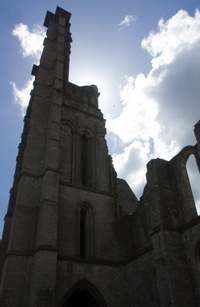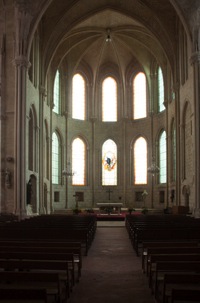Larchant
Note: this was Saturday, May 19 - little late posting this because of the delay in getting connected.
We tried to walk around today, really we did. But though the temperature wasn’t too bad - somewhere around 55 - the 30 mph wind and rain did us in. So we just took a drive through the country-side and visited a couple small towns. We ended in the town of Larchant, which rewarded us with a most unusual church to visit.
I think most Americans, when they think about France, think,”Paris, big city.” Paris is, indeed, a big city and there are other big cities in France, but much of France is beautifully rural. Our drive today took us through miles and miles of farmlands, and a number of villages. The views were just beautiful: many fields are planted in rape-seed - grown for its oil - which are now in bloom. These fields are a brilliant yellow. Many fields are a deep green (don’t know what’s planted there), and others are fallow: plowed but not planted. So the vistas are miles and miles of bright yellow, deep green and dark brown fields, interspersed with small copses of trees.
France is a country of villages. I’d guess that if I drew a circle on the map 15 miles across and centered on Montigny, that circle would capture more than 150 villages with less than 1,500 people in each. These villages have existed forever and, if they now have traffic signs and cars, mostly they look as they have for hundreds of years.
In our drive, I saw a sign pointing to Larchant. We have an excellent book on France titled the “France - A Phaidon Cultural Guide” which details every small cultural detail of the slightest interest throughout France. I had read the entry for Larchant, as it is not too far from us, and remembered that it’s thought that a Saint Mathurin was born there in the third century. Whether he was born there or not, in the Middle Ages a church was built on top of his funerary chapel and became a pilgrimage destination. As Laurie and I are fascinated with pilgrimages (not that we’ve ever been on one), I pointed the car toward Larchant.
The Phaidon guide said about the church in Larchant that the tower had fallen down in the 17th century (right - more or less four hundred years ago). It didn’t mention that the entire church had pretty much fallen into ruins and that, in 1983, a twenty-year effort to restore it began. (Phaidon was published in 1975, before the restoration started.) Much of the church, including the tower, was too far gone to restore, but about a third of the nave, the transept and the choir have all been restored (less part of the roof, which has a wood ceiling now where once it was stone). This church was really big for such a small town (the power of a pilgrimage), and the restored part is, simply stated, beautiful. As much as possible, original materials were recovered from the rubble of the ruins and used, and where that was not possible, stone matching the original stone was quarried and worked as a thousand years ago. Stained glass windows, long gone, were restored with modern stained glass, in modern patterns.


I have no idea how much it cost to restore the Iglise Saint-Mathurin, but I am glad it was done. The church is light and beautiful and gives a sense of how it must have been when a pilgrim arrived after walking hundreds of miles.
By the way, Saint Mathurin is said to have been a healer of madness. We offered up a few prayers for folks we know dealing with that dark problem. Who knows? Maybe Saint Mathurin still has a bit of power to help. And given the rain here, we may need some of that help ourselves soon.